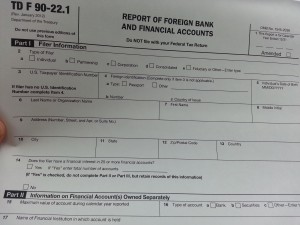Update: For tax year 2013, Form TDF 90-22.1 has been replaced with by the new Form FinCEN 114 and is required to be filed electronically.
The US government has required US citizens and green card holders to file Form TDF 90-22.1 Report of Foreign Bank and Financial Accounts (FBAR) to disclose account balances of foreign bank accounts, brokerage accounts, mutual fund, trust, or other type of foreign financial accounts. The FBAR is required when:
- The United States person had a financial interest in or signature authority over at least one financial account located outside of the United States; and
- The aggregate value of all foreign financial accounts exceeded $10,000 USD at any time during the calendar year to be reported.
The FBAR is a tool to help the US government identify persons who may be using foreign financial accounts to circumvent US law. Investigators use FBARs to help identify or trace funds used for illicit purposes or to identify unreported income maintained or generated abroad. Severe civil and criminal penalties may be imposed for noncompliance of FBAR filing.
In 2011, the IRS also implemented a new reporting requirement for US taxpayers with foreign financial assets greater than certain thresholds beginning at $50,000 USD. This is Form 8938 Statement of Specified Foreign Financial Assets is also required in addition to the FBAR.
Beginning on January 1, 2014, foreign banks and financial institutions will be required to report certain information to the US government about US source income and US account holders. FATCA (Foreign Account Tax Compliance Act) was enacted in 2010 and gradually has required more reporting in stages for individuals and foreign banks and financial institutions.
If you are located in Hong Kong, please contact us today if you have additional questions or would like to schedule a consultation.
Important Notice
The information contained herein serves as a guideline and is only provided for general informational purposes. It should not be considered as offering any tax advice. Since tax laws are complex, you should consult your tax advisor on specific issues related to your tax situation.


Leave A Comment